全国卷高三英语二轮复习题型专项突破——短文改错课件(99张)
文档属性
| 名称 | 全国卷高三英语二轮复习题型专项突破——短文改错课件(99张) |  | |
| 格式 | zip | ||
| 文件大小 | 899.6KB | ||
| 资源类型 | 教案 | ||
| 版本资源 | 通用版 | ||
| 科目 | 英语 | ||
| 更新时间 | 2019-01-27 19:38:08 | ||
图片预览

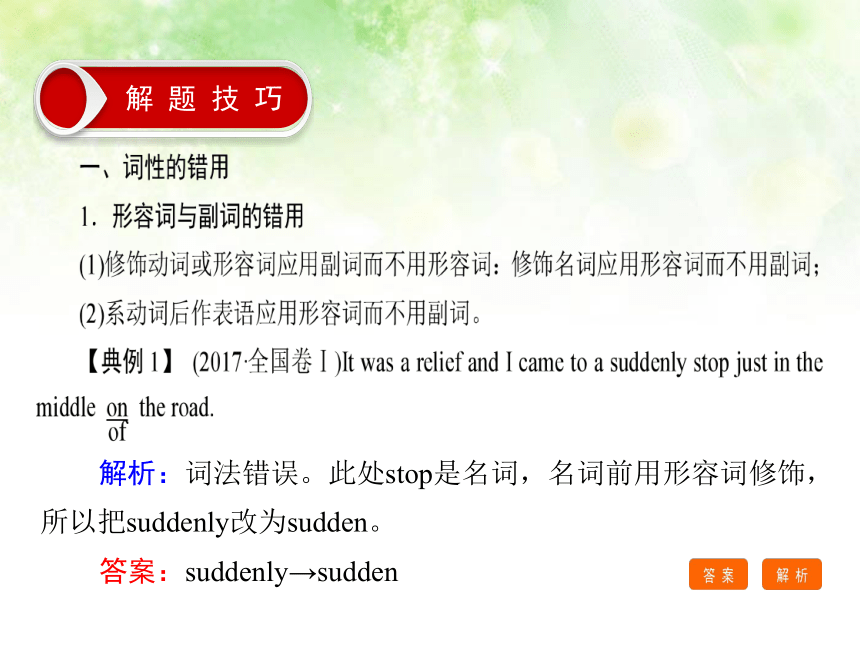
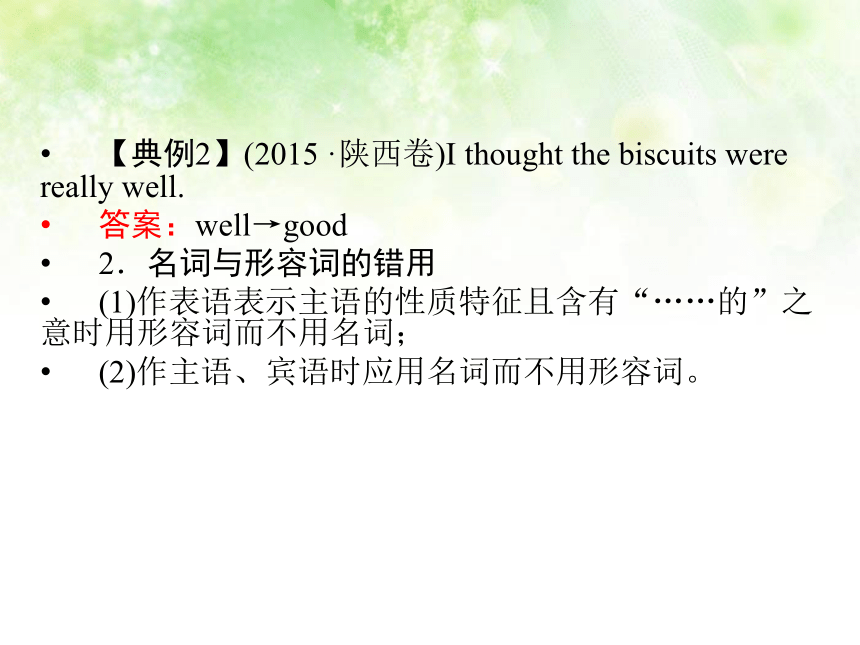
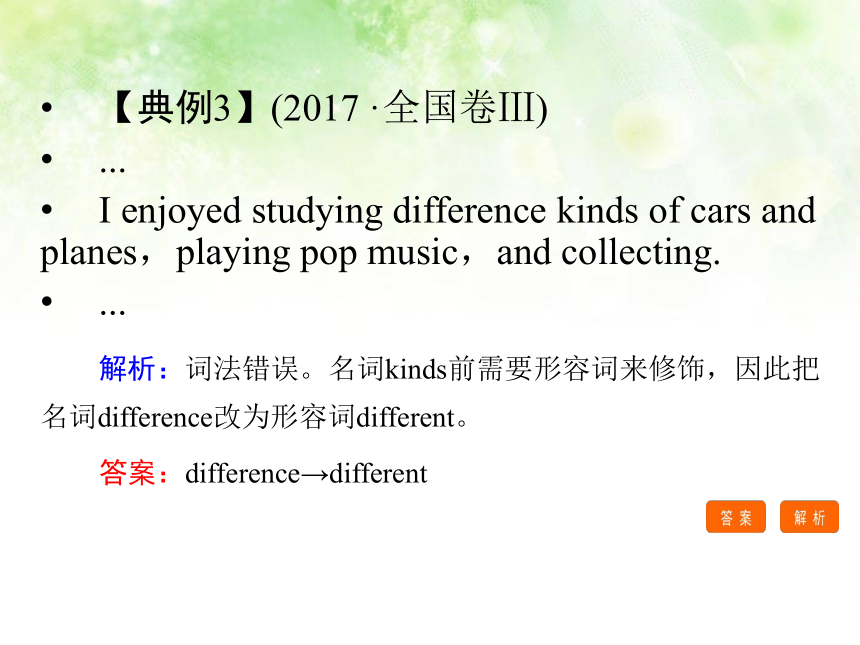
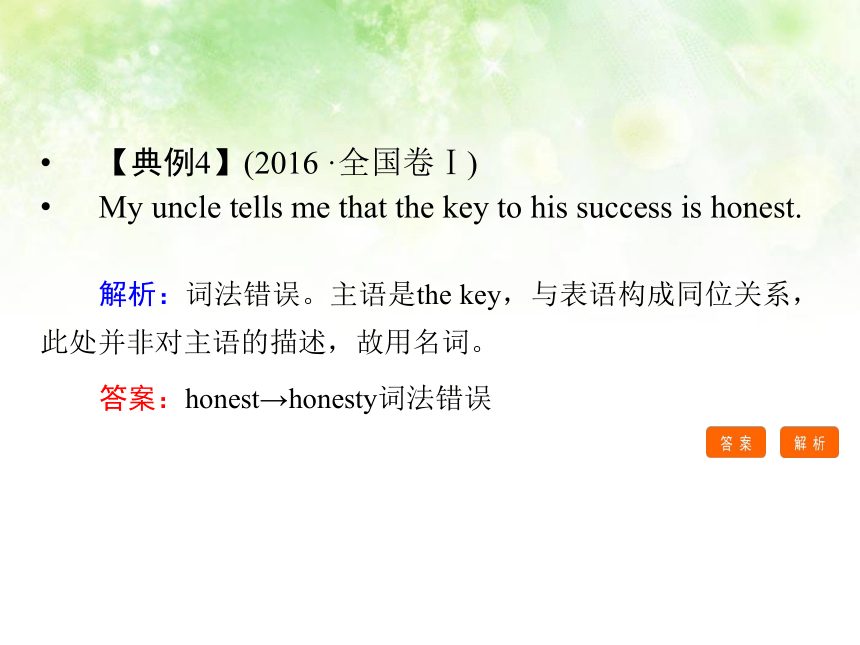


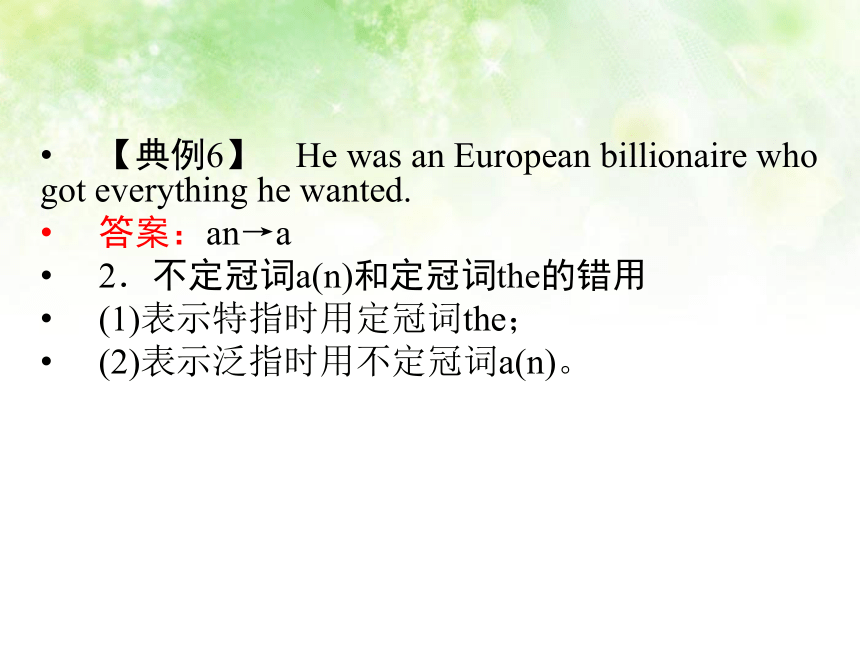

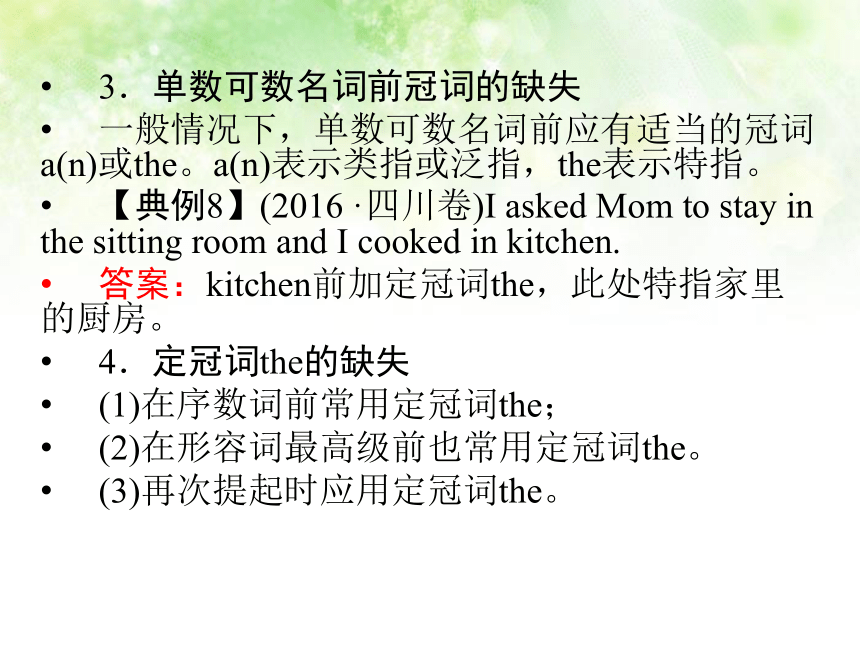
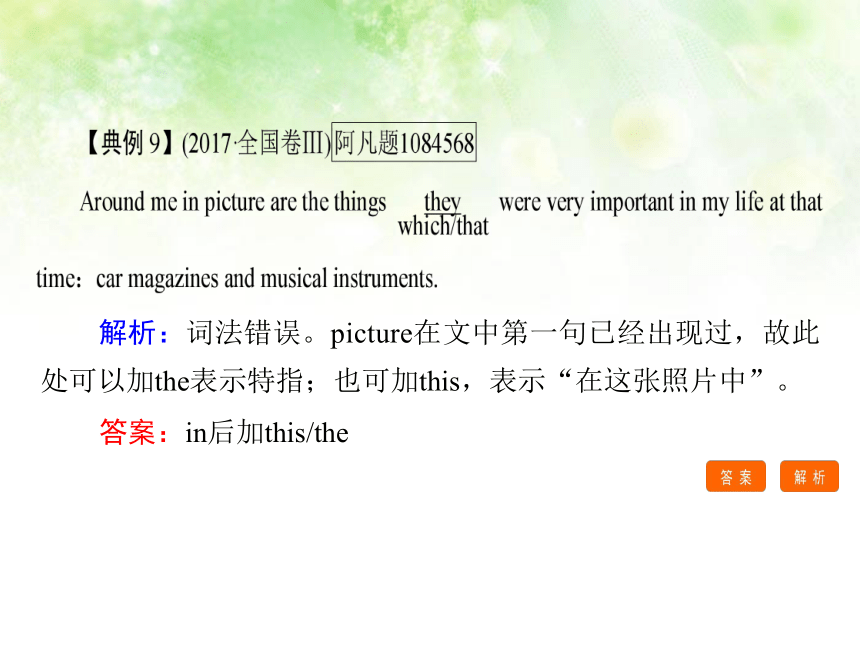
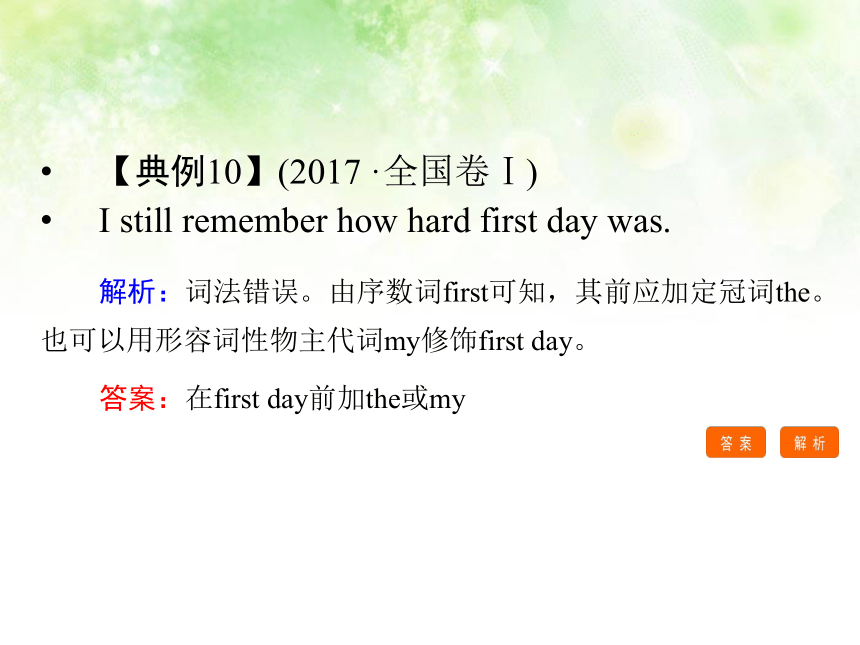
文档简介
题型专项突破
第 二 部 分
专题五 短文改错
第一节 词法错误
解 题 技 巧
解析:词法错误。此处stop是名词,名词前用形容词修饰,所以把suddenly改为sudden。
答案:suddenly→sudden
【典例2】(2015·陕西卷)I thought the biscuits were really well.
答案:well→good
2.名词与形容词的错用
(1)作表语表示主语的性质特征且含有“……的”之意时用形容词而不用名词;
(2)作主语、宾语时应用名词而不用形容词。
【典例3】(2017·全国卷Ⅲ)
...
I enjoyed studying difference kinds of cars and planes,playing pop music,and collecting.
...
解析:词法错误。名词kinds前需要形容词来修饰,因此把名词difference改为形容词different。
答案:difference→different
【典例4】(2016·全国卷Ⅰ)
My uncle tells me that the key to his success is honest.
解析:词法错误。主语是the key,与表语构成同位关系,此处并非对主语的描述,故用名词。
答案:honest→honesty词法错误
二、冠词的错用
1.不定冠词a和an的错用
(1)在元音音素前应用不定冠词an;
(2)在辅音音素前应用不定冠词a;
(3)在有些单词以元音字母开头但却是以辅音音素开头,前面应用冠词a而不是an;还有一些单词以辅音字母开头但却是以元音音素开头,前面应用冠词an而不是a。
【典例5】(2017·全国卷Ⅱ)
They live far from the school,and it takes them about a hour and a half to go to work every day.
解析:词法错误。hour是以元音音素开头的单词,前面要用不定冠词an。表示“一个小时”可以用an hour也可以用one hour。
答案:a→an/one
【典例6】 He was an European billionaire who got everything he wanted.
答案:an→a
2.不定冠词a(n)和定冠词the的错用
(1)表示特指时用定冠词the;
(2)表示泛指时用不定冠词a(n)。
【典例7】(2016·全国甲卷)If we stay at home,it is comfortable and there is no need to spend money.But in that case,we will learn little about world.
解析:world是独一无二的事物,前面要加定冠词the。
答案:world前加the
3.单数可数名词前冠词的缺失
一般情况下,单数可数名词前应有适当的冠词a(n)或the。a(n)表示类指或泛指,the表示特指。
【典例8】(2016·四川卷)I asked Mom to stay in the sitting room and I cooked in kitchen.
答案:kitchen前加定冠词the,此处特指家里的厨房。
4.定冠词the的缺失
(1)在序数词前常用定冠词the;
(2)在形容词最高级前也常用定冠词the。
(3)再次提起时应用定冠词the。
解析:词法错误。picture在文中第一句已经出现过,故此处可以加the表示特指;也可加this,表示“在这张照片中”。
答案:in后加this/the
【典例10】(2017·全国卷Ⅰ)
I still remember how hard first day was.
解析:词法错误。由序数词first可知,其前应加定冠词the。也可以用形容词性物主代词my修饰first day。
答案:在first day前加the或my
5.冠词的多余
可数名词复数或不可数名词表示泛指的不用冠词。
【典例11】(2014·新课标全国卷Ⅱ)There are all kinds of the flowers and trees around the classroom buildings.
答案:去掉flowers前面的the
【典例12】 I think it’s a great fun and I can make more friends.
答案:去掉a
6.常见固定搭配中冠词的缺失与多余
在固定搭配中,有的用不定冠词a(n),有的用定冠词the,而有的不带任何冠词。如:in a hurry,on the right,in fact等。
【典例13】(2016·全国乙卷)My uncle says that he never dreams of becoming rich in the short period of time.
解析:in a short period of time“在短时间内”为固定搭配,故the改为a。
答案:the→a
三、名词数和格的错用
1.可数名词单复数的错用
(1)有些名词常以复数形式出现,例如shoulders,trousers等;
(2)在指示代词this,that后用单数名词;在these,those后用复数名词。
【典例14】 He was tall with broad shoulder and a beard that turned from black toward(to/into)gray over the years.
答案:shoulder→shoulders
【典例15】 It is our duty to work hard to achieve this goals.
答案:goals→goal
2.可数名词与不可数名词的错用
(1)有些词既可作可数名词又可作不可数名词,例如time表示“次数”为可数名词,表示“时间”为不可数名词;
(2)误把不可数名词当作可数名词,例如纯抽象名词progress,luggage,advice等都只能用作不可数名词。
【典例16】(2014·辽宁卷)We’ve called several time about Cleo’s early morning barking.
答案:time→times
【典例17】(2016·四川卷)Mom has a full-time job,so she has to do most of the houseworks.
答案:houseworks→housework。housework“家务”,为不可数名词。
3.误把名词的普通格用作所有格
表示“……的”时应用名词的所有格而不用普通格。
【典例18】 Hearing this,the whole class burst into laughter and my deskmate face turned red.
答案:deskmate→deskmate’s
四、代词的错用
1.代词数的错用
人称代词、物主代词以及反身代词等都有单复数之分,要根据上下文确定单复数。
【典例19】(2015·浙江卷)Close to the school there was a beautiful park with many trees around them.
答案:them→it
2.物主代词的错用
(1)形容词性物主代词相当于形容词,不能单独使用,常用来修饰名词;
(2)名词性物主代词相当于名词,常单独使用,不能修饰名词。
【典例20】 We took ours fishing poles and headed for the lake.
答案:ours→our
【典例21】 I’ve always been dreaming of having an opportunity to travel in English-speaking countries like your to practise and improve my English.
答案:your→yours
3.人称代词的错用
代词指代的人或事物前后应该一致,前面是第几人称,后面也必须对应相应的人称和数。
【典例22】(2017·全国卷Ⅲ)
This picture often brings back to me many happy memories of your high school days.
解析:考查人称指代一致。全文介绍的是“我”的故事,因此这里应该是“我”高中时期的回忆。
答案:your→my
4.不定代词的错用
(1)some(thing)与any(thing);一般来说前者用于肯定句,后者用于疑问句和否定句;
(2)many与much:many代替可数名词,much代替不可数名词;
(3)the other与another:表示“两者中的另一个”用the other,而表示“(三者以上)另外的一个”用another。
【典例23】(2015·陕西卷)I wanted to do anything special for him at his retirement party.
答案:anything→something
【典例24】(2015·高考卷)It’s been three Saturdays now and it really costs me many.
答案:many→much
【典例25】 Dad lost his job,and as Mom explained,“He was lucky to find other one.”
答案:other→another
五、形容词、副词以及比较等级的错用
1.意思相近引起的错用
有些形容词或副词意思相近但不能混用,例如,表示记得很“清楚”,应用clearly/well,而不能用much。
【典例26】I remember my grandfather very much.
答案:much→clearly/well
2.词形相近引起的错用
有些词词形看似差不多但实际词意相差甚远,例如:
(1)hard用作副词时表示“努力地”,而hardly表示“几乎不”;
(2)sometimes表示“有时”,而sometime表示“某个时候”;
(3)high表示具体的高,而highly表示抽象的高。
【典例27】(2013·四川卷)I found the test difficulty(difficult),but I tried hardly to do it.
答案:hardly→hard
【典例28】Sometime you may not be able to decide the situation you are in,and(but) you can change your attitude.
答案:Sometime→Sometimes
3.比较等级的错用
(1)比较级与最高级的错用。表示二者比较用比较级;表示三者或三者以上比较用最高级。
(2)原级与比较级的错用。若句中有than或暗含比较意味用比较级,若没有比较意味或表示同等程度的比较则用原级;
(3)比较级的重复。若形容词或副词后面加了-er,前面就不能再用more,而且more不能修饰比较级,应该用much,even,far,any等修饰比较级。
【典例29】(2016·全国卷Ⅲ)
They were also the best and worse years in my life.
解析:词法错误。and前用了最高级best, 此处也应用最高级。比较级worse应改为最高级worst。
答案:worse→worst
【典例30】(2017·全国卷Ⅱ)
They often get up earlier and water the vegetables together.
解析:考查副词。此处没有比较的意味,所以用early的原级。
答案:earlier→early
【典例31】Moreover,it shows that people are becoming richer and the country is much more stronger.
答案:去掉more
六、介词的错用
1.介词与名词搭配不当
介词与名词搭配时用哪一个介词取决于其后的名词,这时要根据名词选择适当的介词。
【典例32】(2015·新课标全国卷Ⅱ)Tony saw a toy on a shop window.
答案:on→in
2.介词与动词搭配不当
介词与动词搭配时介词的使用取决于动词,这时要根据动词选择适当的介词。
【典例33】(2016·全国卷Ⅲ)
Now I am leaving home to college.
解析:词法错误。leave...for...离开某地到另外一个地方。
答案:college前的to→for
3.介词与形容词搭配不当
介词与形容词搭配时介词的使用是由形容词决定的,这时要根据形容词选择适当的介词。
【典例34】 You should eat more fruit and vegetables,which are rich of vitamins.
答案:of→in
4.介词的多余
(1)及物动词后直接跟宾语,无需加介词;
(2)last,next后跟名词表时间时无需加介词。
【典例35】(2017·全国卷Ⅲ)
When I look at this picture of myself,I realize of how fast time flies.
解析:词法错误。realize认识到,意识到,是及物动词,后面直接跟宾语,不能加介词。
答案:去掉of
【典例36】(2015·陕西卷)My soccer coach retired in last week.
答案:去掉in
5.介词的缺失
不及物动词后跟宾语时应加相应的介词。
【典例37】(2016·全国卷Ⅰ)
My uncle says that he never dreams becoming rich in the short period of time.
解析:词法错误。dream of doing sth.梦想做某事,是固定搭配。
答案:dreams后加of
解析:考查固定搭配。in the middle of意为“在……的中间”,故把on改为of。
答案:on→of
七.谓语动词的错用——时态、语态以及虚拟语气
1.时态错用
常见的判断方法有:
(1)通过上下文中“动作的先后关系”判断,如果主从句的两个动作都发生在过去且没有明显的先后关系,则都用一般过去时;而过去完成时则表示发生在“过去的过去”;
(2)通过句中的“时间标志词”判断,如since then,last time等。
解析:时态错误。文章描述过去的经历,上下文均使用了相应的过去时态,这里应保持一致,用一般过去时,所以把goes改为went。
答案:goes→went
解析:时态错误。考查时态的一致性。由前句的didn’t和后句的felt可判断用一般过去时。
答案:tell→told
2.语态错用
常见错误类型有:
(1)系动词和不及物动词(短语)没有被动语态,误把系动词和不及物动词(短语)当作及物动词而使用被动语态;
(2)被动语态构成错误,其构成形式应为“be+过去分词”。
【典例41】(2014·陕西卷)Suddenly the arrows was(were)flying down at us from the sky—they were looked like rain!
答案:去掉looked或其前的were
【典例42】(2017·全国卷Ⅲ)
About one month after this photo was took,I entered my second year of high school and...
...
解析:考查语态。photo与take为被动关系,故应用被动语态。take的过去分词是taken。
答案:took→taken
3.虚拟语气错用
注意以下几点:
(1)条件状语从句中的虚拟语气。应注意表示与现在、过去、将来事实相反时从句谓语动词的形式;
(2)宾语从句中的虚拟语气。表示“坚持、命令、建议、要求”等词后的宾语从句中谓语动词常用“(should+)动词原形”被动式则为“(should)be+过去分词”;
(3)It’s(high)time(that)后的从句谓语动词用一般过去时或“should+动词原形”,此时should一般不省略。
【典例43】(2015·高考四川)If you are me,would you talk to him(them)?
答案:are→were
【典例44】Therefore,we strongly suggest that similar events are held every year!
答案:are→be
【典例45】Dear fellow students,it’s high time that we pay attention to this phenomenon.
答案:pay→paid或在pay前加should
八、非谓语动词的错用
1.不定式符号to的多余
在感官动词和使役动词(get除外)后面用不带to的不定式作宾语补足语。
【典例46】(2015·浙江卷)The position of the classroom with its view made me felt like I was dreaming.
解析:考查非谓语动词。make sb.do sth.使某人做某事,所以felt要改为feel。
答案:felt→feel
2.不定式符号to的缺失
有些动词,如want,decide,plan等后应接带to的动词不定式作宾语。
【典例47】(2015·高考四川)It’s been a month since I came to this new school and I really want share with you some of the problems I have been experiencing.
答案:want后加to
3.谓语动词与非谓语动词的错用
句中已经有谓语动词,且另一动词不作并列谓语,则只能用非谓语动词。
【典例48】(2015·高考浙江)I enjoyed sit close to the windows and looking at the view.
答案:sit→sitting
【典例49】We’ve been spending a lot of time sing in karaoke bars.
答案:sing→singing
4.过去分词与现在分词的错用
(1)现在分词表示主动、进行;过去分词表示被动、完成;
(2)现在分词转化的形容词表示“令人……的”,常修饰物;而过去分词转化的形容词表示“感到……的”,常修饰人。
【典例50】(2017·全国卷Ⅱ)
In their spare time,they are interesting in planting vegetables in their garden.
...
解析:考查非谓语动词。因为是描述主语they的心理状态,所以使用interested“对……感兴趣的”。
答案:interesting→interested
【典例51】(2016·浙江卷)
It was both excited and frightening to be up there!
解析:词法错误。考查非谓语动词。此句主语是it,指孩子们被父亲放在冰箱顶部这件事是令人兴奋的,exciting常修饰事物,故用exciting。excited常用来修饰人。
答案:excited→exciting
5.对to是介词还是不定式符号的误判
不定式符号to后接动词原形,另外应特别注意含有介词to的短语,如look forward to,get used to,the key to等,它们后跟动词时需用动词的-ing形式。
【典例52】(2014·辽宁卷)It is difficult to understanding why she barks every minute she’s outside.
答案:understanding→understand
【典例53】I am looking forward to see you.
答案:see→seeing
谢
谢
观
看
题型专项突破
第 二 部 分
专题五 短文改错
第二节 句法及语篇型错误
02
高 效 演 练
栏
目
导
航
01
解 题 技 巧
一、主谓一致错误
1.名词作主语时谓语动词单复数的误用
可数名词单数或不可数名词作主语时谓语动词应该用单数。
【典例1】(2017·全国卷Ⅱ)
When summer came,they will invite their students to pick the fresh vegetables!
01
解 题 技 巧
解析:考查动词的时态和主谓一致。时间状语从句的主语为“summer”表示单数,所以应用第三人称单数形式。
答案:came→comes
解析:考查主谓一致。句中主语是we,为复数形式,故应该是were。
答案:was→were
2.非谓语动词或从句作主语时主谓一致错误
动名词、不定式或名词性从句作主语时,谓语动词一般用单数。注意:名词性从句作主语表示复数概念时,谓语动词应用复数。
【典例3】The early morning barking have been disturbing us as we are often up all night with the baby.
答案:have→has
【典例4】Whether the temple should(∧ be) pulled down have caused a heated discussion.
答案:have→has
3.“就近”与“就远”原则的错用
(1)“就近”原则常见的有:either...or...,neither...nor...,not only...but also...,not...but...等;
(2)“就远”原则常见的有:as well as,but,except,(together)with等。
【典例5】I as well as my parents are going to New York City this month.
答案:are→am
【典例6】Not only my parents but also I are good at dancing and singing.
答案:are→am
解析:此句为倒装句。Around me in...放在句首所以应倒装,主句的主语为the things,所以用are作谓语。
【典例8】Among all my friends are a special one I’m most thankful to.
答案:are→is
解析:行文逻辑错误。not only...but also...不仅……而且……,连接并列成分。
答案:and→but
【典例10】 I was fed up with it,and I couldn’t make her stop.
答案:and→but
2.定语从句中关系词的错用或缺失
(1)that与which的错用。在不定代词、最高级、序数词等后用that;在非限制性定语从句和介词后用which;
(2)关系代词与关系副词的错用。关系代词在从句中作主语、宾语、表语和定语;关系副词在从句中作状语;
(3)关系词的缺失。主要考查在there be结构中,容易受汉语影响而漏掉用作主语的关系词who/that/which等。
解析:考查关系代词。此处是非限制性定语从句,且关系代词在从句中作主语,指代上文的garden,所以用which来引导该定语从句。
答案:that→which
【典例12】 It’s really luck(lucky) I came to a restaurant that I am known.
答案:that→where
【典例13】 There are many people think that wealth is better than health.
答案:people后加who或think→thinking
3.状语从句连接的词错用
(1)应搞清是何种状语从句以及它们的连接词;
(2)不要把介词误用作连接词,例如during和with为介词,不能引导状语从句;
(3)应注意容易混淆的连接词,如when,while和as;before和since;unless和until等;
(4)应注意常见的固定句式,如“It’s+一段时间+since...”等。
【典例14】(2015·浙江卷)If I was only a child when I studied in that classroom,I will never forget it.
答案:If→Though/Although
【典例15】In a fact,he even scared my classmates away during they came over to play or do homework with me.
答案:during→when
【典例16】She kept on turning back to see me unless we couldn’t see each other any long(longer).
答案:unless→until
【典例17】It is three years when I became a high school student.
答案:when→since
4.名词性从句连接词的错用或缺失
(1)从属连词(that/whether/if)与连接副词(when,where等)之间的错用。从属连词不作成分,而连接副词作状语;
(2)连接代词(what,which和who等)之间的错用。引导名词性从句且在从句中作主语或宾语时应用what(什么);which(哪一个);who(谁)等,注意它们之间意义的差别;
(3)从属连词与连接代词(what,which,who等)之间的错用。从属连词不作成分,而连接代词需作成分;
(4)从属连词that与whether/if之间的错用。that不作成分,没有实际意义;whether/if也不作成分但有实际意义,有“是否”之意;
(5)从属连词that的缺失。that引导主语从句、表语从句和同位语从句时一般不能省略,引导宾语从句时可以省略。
【典例18】(2016·全国卷Ⅰ)
My uncle is the owner of a restaurant close to that I live.
解析:考查宾语从句。此处表达的是“靠近我所居住的地方”,故需将that改为where。where在此引导宾语从句,并在从句中作地点状语。
答案:that→where
【典例19】(2016·全国卷Ⅱ)
The summer holiday is coming.My classmates and I are talking about how to do during the holiday.
解析:考查疑问词。分析句子可知,are talking about后为“疑问词+to do”作宾语的结构,且do缺少宾语,故将how改为what。
答案:how→what
【典例20】(2015·新课标全国卷Ⅱ)After looks(looking) at the toy for some time,he turned around and found where his parents were missing.
答案:where→that或去掉where
【典例21】There is no doubt whether it is of great help to their study and future life.
答案:whether→that
【典例22】And you should also have a belief you are sure to succeed as long as you keep your direction all the time.
答案:在belief后加that
三、句子成分赘余
1.程度副词多余
一般来说,程度副词不能连用,例如,用了so就不要再用very或too;有了具体的距离,就不要再用far。
【典例23】(2015·新课标全国卷Ⅱ)He liked it so very much that he quickly walked into the shop.
答案:去掉very
【典例24】Here I am in the middle of a city,350 miles far away from our farmhouse.
答案:去掉far
2.定语从句中含有多余的代词或副词
既然引导词已经替代了代词或副词,那么再用代词或副词就属于多余
【典例25】(2017·吉林省实验中学三模)The first thing you must do it is to smile at your classmates.
答案:去掉it
【典例26】(2017·宁夏一中二模)Last week,I returned to the village where I grew up there in my childhood.
答案:去掉there
3.句子成分冗余
受汉语思维影响,出现汉语式结构,造成冗余。例如汉语可以说“虽然……但是……”,但在英语中although与but不能连用。
【典例27】(2016·全国卷Ⅰ)Though not very big,but the restaurant is popular in our area.
答案:去掉but。英语中,在一句话里,though和but不能连用。
4.连词的连用错误
在名词性从句中,从属连词和连接代词/连接副词不能连用。
【典例28】(2014·四川卷)If you notice that when someone is missing and(or) hurt,tell your teacher immediately.
答案:去掉when
四、平行结构错误
并列连词and,or,but等连接的平行结构中前后词类、结构应一致。
【典例29】(2014·四川卷)Don’t panic or get out of line,and trying to remain quiet and calmly(calm).
答案:trying→try
【典例30】(2014·新课标全国卷Ⅱ)We can lie on the grass for a rest,or sat by the lake listening(∧ to)music.
答案:sat→sit
五、句子粘连错误
句子粘连是指两个或两个以上的独立分句没有适当的标点符号或连词连接的句子。修改方式为:把后面的分句改成定语从句,或用and把两个分句连接起来。
【典例31】 As I was leaving the grocery store this afternoon,I saw a poor family—a mother and her four kid(kids) sitting in the cold,it brought back memories from when I was a child.
答案:it→which或it前加and
六、上下文中时态不一致
若上下文叙述的是同一件事情,则时态应具有一致性。
(1)若上下文是一般过去时,则同样用一般过去时;
(2)若上下文是一般现在时,则同样用一般现在时。
【典例32】(2015·高考浙江)In the mornings,it was full of students exercising.The view from the back of the classroom is also splendid.
答案:is→was
【典例33】 When English is an only language in class,students will have more opportunity to practise listening and speaking.However,there were problem with this method.
答案:were→are
七、上下文中代词指代不一致
(1)若文中出现代词,它所代替的词一定存在于文章的某个地方,要注意它们的一致性。
(2)注意一些不定代词的准确意义。如both,neither,either表示两者;而all,none表示三者或三者以上。
【典例34】(2016·全国乙卷)My uncle says that he never dreams of becoming rich in a short period of time.Instead,he hopes that our business will grow steady.
答案:our→his 由句子的主语he可知,他希望他的(his)生意稳步增长。
【典例35】(2014·陕西卷)My uncles immediate(immediately) jumped up and shot their arrows on(at) the bird.Neither of the arrows hit the target.
答案:Neither→None
02
高 效 演 练
谢
谢
观
看
题型专项突破
第 二 部 分
专题五 短文改错
02
知 识 梳 理
03
解 题 技 巧
栏
目
导
航
01
真 题 体 验
A
(2017·全国卷Ⅰ)
In the summer holiday following my eighteen birthday,I took driving lessons.I still remember how hard first day was.Before getting into the car,I thought I had learned the instructor’s orders,so once I started the car,my mind goes blank.I forgot what he had said to me altogether.The instructor kept repeating the word,“Speed up!”“Slow down!”“Turning left!”I was so much nervous that I could hardly tell which direction was left.A few minutes late,the instructor asked me to stop the car.It was a relief and I came to a suddenly stop just in the middle on the road.
01
真 题 体 验
解析:第一处 考查序数词。此处指第18个生日,应使用序数词。故将eighteen改为eighteenth。
第二处 考查冠词或代词。序数词first其前应有定冠词;另外,此处也可表示“我的第一天是多么艰难”,在first之前添加物主代词。故在first前加the/my。
第三处 考查并列连词。本句第二个逗号前后句之间是转折关系。故将so改为but/yet。
第四处 考查动词的时态。此处描述的是过去发生的事情,因此谓语动词应用一般过去时。故将goes改为went。
第五处 考查名词的复数。根据引号内的句子内容可知,此处是说了好几句话。word意为“话语”,为可数名词,应用其复数形式。故将word改为words。
第六处 考查祈使句。此处是一个祈使句,所以应用动词原形。故将Turning改为Turn。
第七处 考查固定句型。so...that...为固定句型,意为“如此……以至于……”。故去掉much。
第八处 考查副词。此处要表达的是“几分钟后”,later是副词,意为“后来,以后”,符合语境。故将late改为later。
第九处 考查形容词。应用形容词修饰名词stop。故将suddenly改为sudden。
第十处 考查介词。in the middle of为固定短语,意为“在……中间”。故将on改为of。
B
(2017·全国卷Ⅱ)
Mr.and Mrs.Zhang all work in our school.They live far from the school,and it takes them about a hour and a half to go to work every day.In their spare time,they are interesting in planting vegetables in their garden,that is on the rooftop of their house.They often get up earlier and water the vegetables together.They have also bought for some gardening tools.Beside,they often get some useful informations from the Internet.When summer came,they will invite their students pick the fresh vegetables!
解析:第一处 考查代词。both表示“两者都”,all表示“(三者或三者以上)都”。根据前面的“Mr.and Mrs.Zhang”可知,此处是两个人。故all改为both或者删掉all。
第二处 考查冠词。泛指“一个小时”应用不定冠词;且hour的读音以元音音素开头。故a改为an或one。
第三处 考查形容词。分析句子结构可知,本句主语是“they”,指代Mr.and Mrs.Zhang,是指人,修饰人应用interested。故interesting改为interested。
第四处 考查定语从句。分析句子结构可知,此处是一个非限制性定语从句,先行词为“garden”,指物,在从句中作主语,应用which引导该从句。故that改为which。
第五处 考查副词。句意为:他们经常早起并一起给蔬菜浇水。此处没有比较含义,应用副词early的原级。故earlier改为early。
第六处 考查动词。buy是及物动词,后面可直接跟宾语,不需要介词。故去掉for。
第七处 考查副词。根据上下文可知,此处列举的是张先生和张太太每天做的事情。besides意为“此外”,符合语境。beside是介词,意为“在……旁边”不符合此处语境。故Beside改为Besides。
第八处 考查名词的数。information是不可数名词,无复数形式。故informations改为information。
第九处 考查动词的时态和主谓一致。根据主句中的“they will”可知,此处应用主将从现原则,即主句使用一般将来时,从句应用一般现在时;且从句的主语为“summer”表示单数,谓语动词应用第三人称单数形式。故came改为comes。
第十处 考查非谓语动词。invite sb.to do sth.是固定用法,意为“邀请某人做某事”。故pick前应加to。
C
(2017·全国卷Ⅲ)
When I look at this picture of myself,I realize of how fast time flies.I had grown not only physically,and also mentally in the past few years.About one month after this photo was took,I entered my second year of high school and become a new member of the school music club.Around me in picture are the things they were very important in my life at that time:car magazines and musical instruments.I enjoyed studying difference kinds of cars and planes,playing pop music,and collecting the late music albums.This picture often brings back to me many happy memories of your high school days.
解析:第一处 考查动词的用法。realize是及物动词,后面跟宾语从句时不用加介词。故去掉of。
第二处 考查动词的时态。根据本句中的时间状语“in the past few years”可知,本句的时态应该为现在完成时。故将had改为have。
第三处 考查连词。“not only...but also...”是固定短语,意为“不仅……而且……”。故将and改为but。
第四处 考查动词的语态。主语this photo和take之间是动宾关系,所以此处应用被动语态。被动语态的结构是“be动词+动词的过去分词”。take的过去分词是taken。故将took改为taken。
第五处 考查动词的时态。根据本句中的谓语动词entered和连词and可知,此处应用一般过去时。故将become改为became。
第六处 考查冠词/限定词。本句中的picture指的是本文第一句中提到的picture,所以此处应在picture前加this或定冠词the表示特指。故在picture前加this/the。
第七处 考查定语从句。分析句子结构可知,things后边的句子是一个定语从句。先行词是the things,指物,且关系词在从句中作主语,所以此处应用关系代词that/which。故将they改为that/which。
第八处 考查形容词。根据空格后的名词短语kinds of可知,此处应用形容词。故将difference改为different。
第九处 考查形容词的最高级。分析语境可知,此处表示,“我”喜欢收藏最新的音乐专辑。latest意为“最新的”。故将late改为latest。
第十处 考查代词。根据逻辑关系可知,那张照片让“我”想起了“我”高中时代的很多美好的回忆。故将your改为my。
02
知 识 梳 理
注意:
短文改错三种错误不用改:
1.大小写不改
2.词序不改
3.标点符号不改
03
高 效 演 练
四要四看
1.四要法
(1)要浏览全文,把握大意。
(2)要找出短文中的句号,把短文拆分成若干句子。短文改错不应按行去分析改错,而应以句子为单位进行断句改错。
(3)要认真分析句子结构,从“多、缺、错”三个方面入手,进行改错。
(4)要重新通读自己改正过的文章,进行检查。
2.四看法
(1)看每行或每句有无“一致性”错误:①主谓是否一致;②指代是否一致;③修饰语与被修饰语是否一致;④前后时态是否一致;⑤单复数是否一致;⑥并列连词and,or,but等前后的形式是否一致。
(2)看每行或每句有无“搭配”错误:①动宾搭配;②动词与介词搭配;③介词与名词搭配;④固定短语等。
(3)看每行或每句有无“词法、语法”错误:①冠词the,an,a误用;②非谓语动词的误用;③引导词误用;④形容词与副词误用;⑤时态、语态使用不当;⑥并列连词误用(and,but,or,so等);⑦名词单复数形式误用等。
(4)看每行或每句有无“逻辑意义”错误,如按照上下文意思本该用push的地方用了pull。
谢
谢
观
看
第 二 部 分
专题五 短文改错
第一节 词法错误
解 题 技 巧
解析:词法错误。此处stop是名词,名词前用形容词修饰,所以把suddenly改为sudden。
答案:suddenly→sudden
【典例2】(2015·陕西卷)I thought the biscuits were really well.
答案:well→good
2.名词与形容词的错用
(1)作表语表示主语的性质特征且含有“……的”之意时用形容词而不用名词;
(2)作主语、宾语时应用名词而不用形容词。
【典例3】(2017·全国卷Ⅲ)
...
I enjoyed studying difference kinds of cars and planes,playing pop music,and collecting.
...
解析:词法错误。名词kinds前需要形容词来修饰,因此把名词difference改为形容词different。
答案:difference→different
【典例4】(2016·全国卷Ⅰ)
My uncle tells me that the key to his success is honest.
解析:词法错误。主语是the key,与表语构成同位关系,此处并非对主语的描述,故用名词。
答案:honest→honesty词法错误
二、冠词的错用
1.不定冠词a和an的错用
(1)在元音音素前应用不定冠词an;
(2)在辅音音素前应用不定冠词a;
(3)在有些单词以元音字母开头但却是以辅音音素开头,前面应用冠词a而不是an;还有一些单词以辅音字母开头但却是以元音音素开头,前面应用冠词an而不是a。
【典例5】(2017·全国卷Ⅱ)
They live far from the school,and it takes them about a hour and a half to go to work every day.
解析:词法错误。hour是以元音音素开头的单词,前面要用不定冠词an。表示“一个小时”可以用an hour也可以用one hour。
答案:a→an/one
【典例6】 He was an European billionaire who got everything he wanted.
答案:an→a
2.不定冠词a(n)和定冠词the的错用
(1)表示特指时用定冠词the;
(2)表示泛指时用不定冠词a(n)。
【典例7】(2016·全国甲卷)If we stay at home,it is comfortable and there is no need to spend money.But in that case,we will learn little about world.
解析:world是独一无二的事物,前面要加定冠词the。
答案:world前加the
3.单数可数名词前冠词的缺失
一般情况下,单数可数名词前应有适当的冠词a(n)或the。a(n)表示类指或泛指,the表示特指。
【典例8】(2016·四川卷)I asked Mom to stay in the sitting room and I cooked in kitchen.
答案:kitchen前加定冠词the,此处特指家里的厨房。
4.定冠词the的缺失
(1)在序数词前常用定冠词the;
(2)在形容词最高级前也常用定冠词the。
(3)再次提起时应用定冠词the。
解析:词法错误。picture在文中第一句已经出现过,故此处可以加the表示特指;也可加this,表示“在这张照片中”。
答案:in后加this/the
【典例10】(2017·全国卷Ⅰ)
I still remember how hard first day was.
解析:词法错误。由序数词first可知,其前应加定冠词the。也可以用形容词性物主代词my修饰first day。
答案:在first day前加the或my
5.冠词的多余
可数名词复数或不可数名词表示泛指的不用冠词。
【典例11】(2014·新课标全国卷Ⅱ)There are all kinds of the flowers and trees around the classroom buildings.
答案:去掉flowers前面的the
【典例12】 I think it’s a great fun and I can make more friends.
答案:去掉a
6.常见固定搭配中冠词的缺失与多余
在固定搭配中,有的用不定冠词a(n),有的用定冠词the,而有的不带任何冠词。如:in a hurry,on the right,in fact等。
【典例13】(2016·全国乙卷)My uncle says that he never dreams of becoming rich in the short period of time.
解析:in a short period of time“在短时间内”为固定搭配,故the改为a。
答案:the→a
三、名词数和格的错用
1.可数名词单复数的错用
(1)有些名词常以复数形式出现,例如shoulders,trousers等;
(2)在指示代词this,that后用单数名词;在these,those后用复数名词。
【典例14】 He was tall with broad shoulder and a beard that turned from black toward(to/into)gray over the years.
答案:shoulder→shoulders
【典例15】 It is our duty to work hard to achieve this goals.
答案:goals→goal
2.可数名词与不可数名词的错用
(1)有些词既可作可数名词又可作不可数名词,例如time表示“次数”为可数名词,表示“时间”为不可数名词;
(2)误把不可数名词当作可数名词,例如纯抽象名词progress,luggage,advice等都只能用作不可数名词。
【典例16】(2014·辽宁卷)We’ve called several time about Cleo’s early morning barking.
答案:time→times
【典例17】(2016·四川卷)Mom has a full-time job,so she has to do most of the houseworks.
答案:houseworks→housework。housework“家务”,为不可数名词。
3.误把名词的普通格用作所有格
表示“……的”时应用名词的所有格而不用普通格。
【典例18】 Hearing this,the whole class burst into laughter and my deskmate face turned red.
答案:deskmate→deskmate’s
四、代词的错用
1.代词数的错用
人称代词、物主代词以及反身代词等都有单复数之分,要根据上下文确定单复数。
【典例19】(2015·浙江卷)Close to the school there was a beautiful park with many trees around them.
答案:them→it
2.物主代词的错用
(1)形容词性物主代词相当于形容词,不能单独使用,常用来修饰名词;
(2)名词性物主代词相当于名词,常单独使用,不能修饰名词。
【典例20】 We took ours fishing poles and headed for the lake.
答案:ours→our
【典例21】 I’ve always been dreaming of having an opportunity to travel in English-speaking countries like your to practise and improve my English.
答案:your→yours
3.人称代词的错用
代词指代的人或事物前后应该一致,前面是第几人称,后面也必须对应相应的人称和数。
【典例22】(2017·全国卷Ⅲ)
This picture often brings back to me many happy memories of your high school days.
解析:考查人称指代一致。全文介绍的是“我”的故事,因此这里应该是“我”高中时期的回忆。
答案:your→my
4.不定代词的错用
(1)some(thing)与any(thing);一般来说前者用于肯定句,后者用于疑问句和否定句;
(2)many与much:many代替可数名词,much代替不可数名词;
(3)the other与another:表示“两者中的另一个”用the other,而表示“(三者以上)另外的一个”用another。
【典例23】(2015·陕西卷)I wanted to do anything special for him at his retirement party.
答案:anything→something
【典例24】(2015·高考卷)It’s been three Saturdays now and it really costs me many.
答案:many→much
【典例25】 Dad lost his job,and as Mom explained,“He was lucky to find other one.”
答案:other→another
五、形容词、副词以及比较等级的错用
1.意思相近引起的错用
有些形容词或副词意思相近但不能混用,例如,表示记得很“清楚”,应用clearly/well,而不能用much。
【典例26】I remember my grandfather very much.
答案:much→clearly/well
2.词形相近引起的错用
有些词词形看似差不多但实际词意相差甚远,例如:
(1)hard用作副词时表示“努力地”,而hardly表示“几乎不”;
(2)sometimes表示“有时”,而sometime表示“某个时候”;
(3)high表示具体的高,而highly表示抽象的高。
【典例27】(2013·四川卷)I found the test difficulty(difficult),but I tried hardly to do it.
答案:hardly→hard
【典例28】Sometime you may not be able to decide the situation you are in,and(but) you can change your attitude.
答案:Sometime→Sometimes
3.比较等级的错用
(1)比较级与最高级的错用。表示二者比较用比较级;表示三者或三者以上比较用最高级。
(2)原级与比较级的错用。若句中有than或暗含比较意味用比较级,若没有比较意味或表示同等程度的比较则用原级;
(3)比较级的重复。若形容词或副词后面加了-er,前面就不能再用more,而且more不能修饰比较级,应该用much,even,far,any等修饰比较级。
【典例29】(2016·全国卷Ⅲ)
They were also the best and worse years in my life.
解析:词法错误。and前用了最高级best, 此处也应用最高级。比较级worse应改为最高级worst。
答案:worse→worst
【典例30】(2017·全国卷Ⅱ)
They often get up earlier and water the vegetables together.
解析:考查副词。此处没有比较的意味,所以用early的原级。
答案:earlier→early
【典例31】Moreover,it shows that people are becoming richer and the country is much more stronger.
答案:去掉more
六、介词的错用
1.介词与名词搭配不当
介词与名词搭配时用哪一个介词取决于其后的名词,这时要根据名词选择适当的介词。
【典例32】(2015·新课标全国卷Ⅱ)Tony saw a toy on a shop window.
答案:on→in
2.介词与动词搭配不当
介词与动词搭配时介词的使用取决于动词,这时要根据动词选择适当的介词。
【典例33】(2016·全国卷Ⅲ)
Now I am leaving home to college.
解析:词法错误。leave...for...离开某地到另外一个地方。
答案:college前的to→for
3.介词与形容词搭配不当
介词与形容词搭配时介词的使用是由形容词决定的,这时要根据形容词选择适当的介词。
【典例34】 You should eat more fruit and vegetables,which are rich of vitamins.
答案:of→in
4.介词的多余
(1)及物动词后直接跟宾语,无需加介词;
(2)last,next后跟名词表时间时无需加介词。
【典例35】(2017·全国卷Ⅲ)
When I look at this picture of myself,I realize of how fast time flies.
解析:词法错误。realize认识到,意识到,是及物动词,后面直接跟宾语,不能加介词。
答案:去掉of
【典例36】(2015·陕西卷)My soccer coach retired in last week.
答案:去掉in
5.介词的缺失
不及物动词后跟宾语时应加相应的介词。
【典例37】(2016·全国卷Ⅰ)
My uncle says that he never dreams becoming rich in the short period of time.
解析:词法错误。dream of doing sth.梦想做某事,是固定搭配。
答案:dreams后加of
解析:考查固定搭配。in the middle of意为“在……的中间”,故把on改为of。
答案:on→of
七.谓语动词的错用——时态、语态以及虚拟语气
1.时态错用
常见的判断方法有:
(1)通过上下文中“动作的先后关系”判断,如果主从句的两个动作都发生在过去且没有明显的先后关系,则都用一般过去时;而过去完成时则表示发生在“过去的过去”;
(2)通过句中的“时间标志词”判断,如since then,last time等。
解析:时态错误。文章描述过去的经历,上下文均使用了相应的过去时态,这里应保持一致,用一般过去时,所以把goes改为went。
答案:goes→went
解析:时态错误。考查时态的一致性。由前句的didn’t和后句的felt可判断用一般过去时。
答案:tell→told
2.语态错用
常见错误类型有:
(1)系动词和不及物动词(短语)没有被动语态,误把系动词和不及物动词(短语)当作及物动词而使用被动语态;
(2)被动语态构成错误,其构成形式应为“be+过去分词”。
【典例41】(2014·陕西卷)Suddenly the arrows was(were)flying down at us from the sky—they were looked like rain!
答案:去掉looked或其前的were
【典例42】(2017·全国卷Ⅲ)
About one month after this photo was took,I entered my second year of high school and...
...
解析:考查语态。photo与take为被动关系,故应用被动语态。take的过去分词是taken。
答案:took→taken
3.虚拟语气错用
注意以下几点:
(1)条件状语从句中的虚拟语气。应注意表示与现在、过去、将来事实相反时从句谓语动词的形式;
(2)宾语从句中的虚拟语气。表示“坚持、命令、建议、要求”等词后的宾语从句中谓语动词常用“(should+)动词原形”被动式则为“(should)be+过去分词”;
(3)It’s(high)time(that)后的从句谓语动词用一般过去时或“should+动词原形”,此时should一般不省略。
【典例43】(2015·高考四川)If you are me,would you talk to him(them)?
答案:are→were
【典例44】Therefore,we strongly suggest that similar events are held every year!
答案:are→be
【典例45】Dear fellow students,it’s high time that we pay attention to this phenomenon.
答案:pay→paid或在pay前加should
八、非谓语动词的错用
1.不定式符号to的多余
在感官动词和使役动词(get除外)后面用不带to的不定式作宾语补足语。
【典例46】(2015·浙江卷)The position of the classroom with its view made me felt like I was dreaming.
解析:考查非谓语动词。make sb.do sth.使某人做某事,所以felt要改为feel。
答案:felt→feel
2.不定式符号to的缺失
有些动词,如want,decide,plan等后应接带to的动词不定式作宾语。
【典例47】(2015·高考四川)It’s been a month since I came to this new school and I really want share with you some of the problems I have been experiencing.
答案:want后加to
3.谓语动词与非谓语动词的错用
句中已经有谓语动词,且另一动词不作并列谓语,则只能用非谓语动词。
【典例48】(2015·高考浙江)I enjoyed sit close to the windows and looking at the view.
答案:sit→sitting
【典例49】We’ve been spending a lot of time sing in karaoke bars.
答案:sing→singing
4.过去分词与现在分词的错用
(1)现在分词表示主动、进行;过去分词表示被动、完成;
(2)现在分词转化的形容词表示“令人……的”,常修饰物;而过去分词转化的形容词表示“感到……的”,常修饰人。
【典例50】(2017·全国卷Ⅱ)
In their spare time,they are interesting in planting vegetables in their garden.
...
解析:考查非谓语动词。因为是描述主语they的心理状态,所以使用interested“对……感兴趣的”。
答案:interesting→interested
【典例51】(2016·浙江卷)
It was both excited and frightening to be up there!
解析:词法错误。考查非谓语动词。此句主语是it,指孩子们被父亲放在冰箱顶部这件事是令人兴奋的,exciting常修饰事物,故用exciting。excited常用来修饰人。
答案:excited→exciting
5.对to是介词还是不定式符号的误判
不定式符号to后接动词原形,另外应特别注意含有介词to的短语,如look forward to,get used to,the key to等,它们后跟动词时需用动词的-ing形式。
【典例52】(2014·辽宁卷)It is difficult to understanding why she barks every minute she’s outside.
答案:understanding→understand
【典例53】I am looking forward to see you.
答案:see→seeing
谢
谢
观
看
题型专项突破
第 二 部 分
专题五 短文改错
第二节 句法及语篇型错误
02
高 效 演 练
栏
目
导
航
01
解 题 技 巧
一、主谓一致错误
1.名词作主语时谓语动词单复数的误用
可数名词单数或不可数名词作主语时谓语动词应该用单数。
【典例1】(2017·全国卷Ⅱ)
When summer came,they will invite their students to pick the fresh vegetables!
01
解 题 技 巧
解析:考查动词的时态和主谓一致。时间状语从句的主语为“summer”表示单数,所以应用第三人称单数形式。
答案:came→comes
解析:考查主谓一致。句中主语是we,为复数形式,故应该是were。
答案:was→were
2.非谓语动词或从句作主语时主谓一致错误
动名词、不定式或名词性从句作主语时,谓语动词一般用单数。注意:名词性从句作主语表示复数概念时,谓语动词应用复数。
【典例3】The early morning barking have been disturbing us as we are often up all night with the baby.
答案:have→has
【典例4】Whether the temple should(∧ be) pulled down have caused a heated discussion.
答案:have→has
3.“就近”与“就远”原则的错用
(1)“就近”原则常见的有:either...or...,neither...nor...,not only...but also...,not...but...等;
(2)“就远”原则常见的有:as well as,but,except,(together)with等。
【典例5】I as well as my parents are going to New York City this month.
答案:are→am
【典例6】Not only my parents but also I are good at dancing and singing.
答案:are→am
解析:此句为倒装句。Around me in...放在句首所以应倒装,主句的主语为the things,所以用are作谓语。
【典例8】Among all my friends are a special one I’m most thankful to.
答案:are→is
解析:行文逻辑错误。not only...but also...不仅……而且……,连接并列成分。
答案:and→but
【典例10】 I was fed up with it,and I couldn’t make her stop.
答案:and→but
2.定语从句中关系词的错用或缺失
(1)that与which的错用。在不定代词、最高级、序数词等后用that;在非限制性定语从句和介词后用which;
(2)关系代词与关系副词的错用。关系代词在从句中作主语、宾语、表语和定语;关系副词在从句中作状语;
(3)关系词的缺失。主要考查在there be结构中,容易受汉语影响而漏掉用作主语的关系词who/that/which等。
解析:考查关系代词。此处是非限制性定语从句,且关系代词在从句中作主语,指代上文的garden,所以用which来引导该定语从句。
答案:that→which
【典例12】 It’s really luck(lucky) I came to a restaurant that I am known.
答案:that→where
【典例13】 There are many people think that wealth is better than health.
答案:people后加who或think→thinking
3.状语从句连接的词错用
(1)应搞清是何种状语从句以及它们的连接词;
(2)不要把介词误用作连接词,例如during和with为介词,不能引导状语从句;
(3)应注意容易混淆的连接词,如when,while和as;before和since;unless和until等;
(4)应注意常见的固定句式,如“It’s+一段时间+since...”等。
【典例14】(2015·浙江卷)If I was only a child when I studied in that classroom,I will never forget it.
答案:If→Though/Although
【典例15】In a fact,he even scared my classmates away during they came over to play or do homework with me.
答案:during→when
【典例16】She kept on turning back to see me unless we couldn’t see each other any long(longer).
答案:unless→until
【典例17】It is three years when I became a high school student.
答案:when→since
4.名词性从句连接词的错用或缺失
(1)从属连词(that/whether/if)与连接副词(when,where等)之间的错用。从属连词不作成分,而连接副词作状语;
(2)连接代词(what,which和who等)之间的错用。引导名词性从句且在从句中作主语或宾语时应用what(什么);which(哪一个);who(谁)等,注意它们之间意义的差别;
(3)从属连词与连接代词(what,which,who等)之间的错用。从属连词不作成分,而连接代词需作成分;
(4)从属连词that与whether/if之间的错用。that不作成分,没有实际意义;whether/if也不作成分但有实际意义,有“是否”之意;
(5)从属连词that的缺失。that引导主语从句、表语从句和同位语从句时一般不能省略,引导宾语从句时可以省略。
【典例18】(2016·全国卷Ⅰ)
My uncle is the owner of a restaurant close to that I live.
解析:考查宾语从句。此处表达的是“靠近我所居住的地方”,故需将that改为where。where在此引导宾语从句,并在从句中作地点状语。
答案:that→where
【典例19】(2016·全国卷Ⅱ)
The summer holiday is coming.My classmates and I are talking about how to do during the holiday.
解析:考查疑问词。分析句子可知,are talking about后为“疑问词+to do”作宾语的结构,且do缺少宾语,故将how改为what。
答案:how→what
【典例20】(2015·新课标全国卷Ⅱ)After looks(looking) at the toy for some time,he turned around and found where his parents were missing.
答案:where→that或去掉where
【典例21】There is no doubt whether it is of great help to their study and future life.
答案:whether→that
【典例22】And you should also have a belief you are sure to succeed as long as you keep your direction all the time.
答案:在belief后加that
三、句子成分赘余
1.程度副词多余
一般来说,程度副词不能连用,例如,用了so就不要再用very或too;有了具体的距离,就不要再用far。
【典例23】(2015·新课标全国卷Ⅱ)He liked it so very much that he quickly walked into the shop.
答案:去掉very
【典例24】Here I am in the middle of a city,350 miles far away from our farmhouse.
答案:去掉far
2.定语从句中含有多余的代词或副词
既然引导词已经替代了代词或副词,那么再用代词或副词就属于多余
【典例25】(2017·吉林省实验中学三模)The first thing you must do it is to smile at your classmates.
答案:去掉it
【典例26】(2017·宁夏一中二模)Last week,I returned to the village where I grew up there in my childhood.
答案:去掉there
3.句子成分冗余
受汉语思维影响,出现汉语式结构,造成冗余。例如汉语可以说“虽然……但是……”,但在英语中although与but不能连用。
【典例27】(2016·全国卷Ⅰ)Though not very big,but the restaurant is popular in our area.
答案:去掉but。英语中,在一句话里,though和but不能连用。
4.连词的连用错误
在名词性从句中,从属连词和连接代词/连接副词不能连用。
【典例28】(2014·四川卷)If you notice that when someone is missing and(or) hurt,tell your teacher immediately.
答案:去掉when
四、平行结构错误
并列连词and,or,but等连接的平行结构中前后词类、结构应一致。
【典例29】(2014·四川卷)Don’t panic or get out of line,and trying to remain quiet and calmly(calm).
答案:trying→try
【典例30】(2014·新课标全国卷Ⅱ)We can lie on the grass for a rest,or sat by the lake listening(∧ to)music.
答案:sat→sit
五、句子粘连错误
句子粘连是指两个或两个以上的独立分句没有适当的标点符号或连词连接的句子。修改方式为:把后面的分句改成定语从句,或用and把两个分句连接起来。
【典例31】 As I was leaving the grocery store this afternoon,I saw a poor family—a mother and her four kid(kids) sitting in the cold,it brought back memories from when I was a child.
答案:it→which或it前加and
六、上下文中时态不一致
若上下文叙述的是同一件事情,则时态应具有一致性。
(1)若上下文是一般过去时,则同样用一般过去时;
(2)若上下文是一般现在时,则同样用一般现在时。
【典例32】(2015·高考浙江)In the mornings,it was full of students exercising.The view from the back of the classroom is also splendid.
答案:is→was
【典例33】 When English is an only language in class,students will have more opportunity to practise listening and speaking.However,there were problem with this method.
答案:were→are
七、上下文中代词指代不一致
(1)若文中出现代词,它所代替的词一定存在于文章的某个地方,要注意它们的一致性。
(2)注意一些不定代词的准确意义。如both,neither,either表示两者;而all,none表示三者或三者以上。
【典例34】(2016·全国乙卷)My uncle says that he never dreams of becoming rich in a short period of time.Instead,he hopes that our business will grow steady.
答案:our→his 由句子的主语he可知,他希望他的(his)生意稳步增长。
【典例35】(2014·陕西卷)My uncles immediate(immediately) jumped up and shot their arrows on(at) the bird.Neither of the arrows hit the target.
答案:Neither→None
02
高 效 演 练
谢
谢
观
看
题型专项突破
第 二 部 分
专题五 短文改错
02
知 识 梳 理
03
解 题 技 巧
栏
目
导
航
01
真 题 体 验
A
(2017·全国卷Ⅰ)
In the summer holiday following my eighteen birthday,I took driving lessons.I still remember how hard first day was.Before getting into the car,I thought I had learned the instructor’s orders,so once I started the car,my mind goes blank.I forgot what he had said to me altogether.The instructor kept repeating the word,“Speed up!”“Slow down!”“Turning left!”I was so much nervous that I could hardly tell which direction was left.A few minutes late,the instructor asked me to stop the car.It was a relief and I came to a suddenly stop just in the middle on the road.
01
真 题 体 验
解析:第一处 考查序数词。此处指第18个生日,应使用序数词。故将eighteen改为eighteenth。
第二处 考查冠词或代词。序数词first其前应有定冠词;另外,此处也可表示“我的第一天是多么艰难”,在first之前添加物主代词。故在first前加the/my。
第三处 考查并列连词。本句第二个逗号前后句之间是转折关系。故将so改为but/yet。
第四处 考查动词的时态。此处描述的是过去发生的事情,因此谓语动词应用一般过去时。故将goes改为went。
第五处 考查名词的复数。根据引号内的句子内容可知,此处是说了好几句话。word意为“话语”,为可数名词,应用其复数形式。故将word改为words。
第六处 考查祈使句。此处是一个祈使句,所以应用动词原形。故将Turning改为Turn。
第七处 考查固定句型。so...that...为固定句型,意为“如此……以至于……”。故去掉much。
第八处 考查副词。此处要表达的是“几分钟后”,later是副词,意为“后来,以后”,符合语境。故将late改为later。
第九处 考查形容词。应用形容词修饰名词stop。故将suddenly改为sudden。
第十处 考查介词。in the middle of为固定短语,意为“在……中间”。故将on改为of。
B
(2017·全国卷Ⅱ)
Mr.and Mrs.Zhang all work in our school.They live far from the school,and it takes them about a hour and a half to go to work every day.In their spare time,they are interesting in planting vegetables in their garden,that is on the rooftop of their house.They often get up earlier and water the vegetables together.They have also bought for some gardening tools.Beside,they often get some useful informations from the Internet.When summer came,they will invite their students pick the fresh vegetables!
解析:第一处 考查代词。both表示“两者都”,all表示“(三者或三者以上)都”。根据前面的“Mr.and Mrs.Zhang”可知,此处是两个人。故all改为both或者删掉all。
第二处 考查冠词。泛指“一个小时”应用不定冠词;且hour的读音以元音音素开头。故a改为an或one。
第三处 考查形容词。分析句子结构可知,本句主语是“they”,指代Mr.and Mrs.Zhang,是指人,修饰人应用interested。故interesting改为interested。
第四处 考查定语从句。分析句子结构可知,此处是一个非限制性定语从句,先行词为“garden”,指物,在从句中作主语,应用which引导该从句。故that改为which。
第五处 考查副词。句意为:他们经常早起并一起给蔬菜浇水。此处没有比较含义,应用副词early的原级。故earlier改为early。
第六处 考查动词。buy是及物动词,后面可直接跟宾语,不需要介词。故去掉for。
第七处 考查副词。根据上下文可知,此处列举的是张先生和张太太每天做的事情。besides意为“此外”,符合语境。beside是介词,意为“在……旁边”不符合此处语境。故Beside改为Besides。
第八处 考查名词的数。information是不可数名词,无复数形式。故informations改为information。
第九处 考查动词的时态和主谓一致。根据主句中的“they will”可知,此处应用主将从现原则,即主句使用一般将来时,从句应用一般现在时;且从句的主语为“summer”表示单数,谓语动词应用第三人称单数形式。故came改为comes。
第十处 考查非谓语动词。invite sb.to do sth.是固定用法,意为“邀请某人做某事”。故pick前应加to。
C
(2017·全国卷Ⅲ)
When I look at this picture of myself,I realize of how fast time flies.I had grown not only physically,and also mentally in the past few years.About one month after this photo was took,I entered my second year of high school and become a new member of the school music club.Around me in picture are the things they were very important in my life at that time:car magazines and musical instruments.I enjoyed studying difference kinds of cars and planes,playing pop music,and collecting the late music albums.This picture often brings back to me many happy memories of your high school days.
解析:第一处 考查动词的用法。realize是及物动词,后面跟宾语从句时不用加介词。故去掉of。
第二处 考查动词的时态。根据本句中的时间状语“in the past few years”可知,本句的时态应该为现在完成时。故将had改为have。
第三处 考查连词。“not only...but also...”是固定短语,意为“不仅……而且……”。故将and改为but。
第四处 考查动词的语态。主语this photo和take之间是动宾关系,所以此处应用被动语态。被动语态的结构是“be动词+动词的过去分词”。take的过去分词是taken。故将took改为taken。
第五处 考查动词的时态。根据本句中的谓语动词entered和连词and可知,此处应用一般过去时。故将become改为became。
第六处 考查冠词/限定词。本句中的picture指的是本文第一句中提到的picture,所以此处应在picture前加this或定冠词the表示特指。故在picture前加this/the。
第七处 考查定语从句。分析句子结构可知,things后边的句子是一个定语从句。先行词是the things,指物,且关系词在从句中作主语,所以此处应用关系代词that/which。故将they改为that/which。
第八处 考查形容词。根据空格后的名词短语kinds of可知,此处应用形容词。故将difference改为different。
第九处 考查形容词的最高级。分析语境可知,此处表示,“我”喜欢收藏最新的音乐专辑。latest意为“最新的”。故将late改为latest。
第十处 考查代词。根据逻辑关系可知,那张照片让“我”想起了“我”高中时代的很多美好的回忆。故将your改为my。
02
知 识 梳 理
注意:
短文改错三种错误不用改:
1.大小写不改
2.词序不改
3.标点符号不改
03
高 效 演 练
四要四看
1.四要法
(1)要浏览全文,把握大意。
(2)要找出短文中的句号,把短文拆分成若干句子。短文改错不应按行去分析改错,而应以句子为单位进行断句改错。
(3)要认真分析句子结构,从“多、缺、错”三个方面入手,进行改错。
(4)要重新通读自己改正过的文章,进行检查。
2.四看法
(1)看每行或每句有无“一致性”错误:①主谓是否一致;②指代是否一致;③修饰语与被修饰语是否一致;④前后时态是否一致;⑤单复数是否一致;⑥并列连词and,or,but等前后的形式是否一致。
(2)看每行或每句有无“搭配”错误:①动宾搭配;②动词与介词搭配;③介词与名词搭配;④固定短语等。
(3)看每行或每句有无“词法、语法”错误:①冠词the,an,a误用;②非谓语动词的误用;③引导词误用;④形容词与副词误用;⑤时态、语态使用不当;⑥并列连词误用(and,but,or,so等);⑦名词单复数形式误用等。
(4)看每行或每句有无“逻辑意义”错误,如按照上下文意思本该用push的地方用了pull。
谢
谢
观
看
